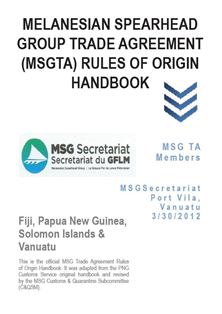Vanuatu Rules of Origin Handbook
This Handbook provides a summary explanation of the qualification provisions, certification requirements, documents specified to be used to certify origin, and designated certifying authorities for each of the trade agreements of which Vanuatu is a member or a beneficiary, with cross-references to the manuals or reference documents published for these agreements.
Specific focus has been given to areas of uncertainty, confusion, lack of understanding of the provisions, import requirements and export opportunities of the various agreements on the part of importers, exporters, Customs brokers and Freight forwarders, as identified in the course of interviews conducted with private sector stakeholders in Port Vila and Santo during the project to support the development of rules of origin procedures and rules of origin capacity building in Vanuatu.
Click on the image to view the Rules of Origin Handbook.
Compendium of Procedural Mechanisms Used in the Application of Rules of Origin
When two or more countries decide to enter into a preferential trade agreement, a focus of concern is to devise a mechanism by which the benefits of the agreement are granted only upon the importation into one member country of goods that are legitimately the produce of the other country or countries participating in the agreement, and that the goods of countries that are not participants in the agreement do not receive preferential treatment. Every preferential trade agreement, therefore, contains a set of rules of origin that are intended to ensure that the benefits of the agreement are limited to the goods produced in the member countries of the agreement. This Compendium presents an explanation of the mechanisms by which the rules of origin of trade agreements are applied.
The rules applied to determine origin employ two different basic criteria:
- The criterion of goods “wholly produced " in a given country, where only one country enters into consideration in attributing origin; and
- The criterion of "substantial transformation", where two or more countries have taken part in the production of the goods.
The “wholly produced " criterion applies mainly to "natural " products and to goods made entirely from them, so that goods containing any parts or materials imported or of undetermined origin are generally excluded from its field of application. The "substantial transformation" criterion can be expressed by a number of different methods and mechanisms of application.
Click on the image to view the Rules of Origin Compendium.
Melanesian Spearhead Group Trade Agreement (MSGTA)
Reference is made in this section to the Melanesian Spearhead Group Trade Agreement (MSGTA) Rules of Origin Handbook, published by the MSG Secretariat, as a source of further information and elaboration.
Click on the image to view the MSGTA Rules of Origin Handbook.
Participating Countries
Participating countries in the Melanesian Spearhead Group Trade Agreement (MSGTA) are:
- Fiji
- Papua New Guinea
- Solomon Islands
- Vanuatu
Preferential Duty Rate Coverage
(Refer to pages 4, 5 to 7 and 17 to 32 of the MSGTA Handbook for additional information)
The MSG Trade Agreement provides for preferential duty rates on the importation into the participating countries of all goods originating in the other participating countries, except for:
- Chapter 22 - Beverages, Spirits and Vinegar. All products except items described in HS Tariff code 2201, 2202 and 2209;
- Chapter 24 - Tobacco and manufactured tobacco substitute;
- Chapter 27 -Mineral fuels, mineral oils and products of their distillation; bituminous mineral waxes; and
- Cane sugar of HS Code 1701.1100.
The content of this article is published through a project on the Support to the Development of Rules of Origin Capacity Building which is funded by the European Union and implemented by ACE International Consultants.

